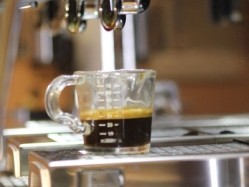Calls for ongoing barista training as research shows 54% can’t make an espresso

The research by the Beverage Standards Association (BSA) was carried out on 100 self-nominated entries to the 2013 BSA Awards with assessors secretly marking baristas on their creation of a small espresso, looking at a required liquid volume between 25 to 30ml with good crema; an acceptable extraction time of 20 to 30 seconds and the temperature to be between 63 and 67 degrees.
However, the BSA found that more than half of those assessed failed against all criteria with the main reason being under extraction.
BSA member and independent barista trainer, Jon Skinner, said: “These figures are appalling and show a complete lack of baristas monitoring their extraction times. Bear in mind that this information is drawn from operators who have entered the BSA Awards intended to identify excellence. They are likely to be better than average, so the quality factor with most coffee shops will be lower.”
Taste
The figures follow a survey earlier this month by consumer rights group Which? into the taste and quality of coffee at five of the UK’s major high street chains – Caffè Nero, Costa, M&S, Pret a Manger and Starbucks.
An expert for the group tested an Americano and a cappuccino at all and rated them for taste, but found ‘big differences’ in quality, rating Caffè Nero the highest and Pret a Manger the lowest.
Training
Skinner said findings highlighted the importance of regular training for baristas at outlets where quality coffee was important to sales.
"People don’t appreciate the complexity involved in making a great cup of coffee," he said. "These figures highlight the importance of ongoing training – not just when the coffee shop or café opens, but training must continue once the business is up and running."
However, while ongoing training may be key to improving quality for some operators, Matt Lane, head of beverage solutions at Nestlé Professional, believes that it is not be the solution for all operators and suggests business owners weigh up the pros and cons of offering customers barista-made coffee versus machine-made coffee, particularly if staff turnover is high.
"Continued high staff turnover in the coffee shop sector is having a negative impact on quality, as individual sites struggle to balance the immediate need for customer-facing staff in light of a departure and having new staff members complete a full training course before they are allowed to make beverages for the paying public," he said.
Quality
"This predicament begs a new question; how can a market that grew by a staggering 7.5 per cent in 2012 keep up with its staff needs if its already facing challenges in that area? Something will have to give, and it had better not be quality.
“The simple fact of the matter is that the traditional barista format will be unlikely to cope with the British public’s on-going love affair with coffee; like-for-like sales growth of speciality coffees has seen a rise of 3.5 per cent in just 12 months and this is predicted to continue rising. But where the traditional format is lacking, the automated machine is coming to the rescue.
“Leaps and bounds have been made in the past few years in the machine sector and huge innovations in the industry have seen the development of machines that come as close to producing barista style coffees as possible.”
Whether outlets offer barista-made or machine-made coffee, Ranald Paterson, head assessor for this year's BSA Awards, reminded operators that a quality coffee offering did not stop with the person making it.
“The Association would like to encourage other cafe staff and owner non baristas to take part in training. The coffee delivery chain does not end with the barista but responsibility should be shared with owners, managers, servers, and waiters. All should understand the difference between good and bad espresso in particular," he said.

















